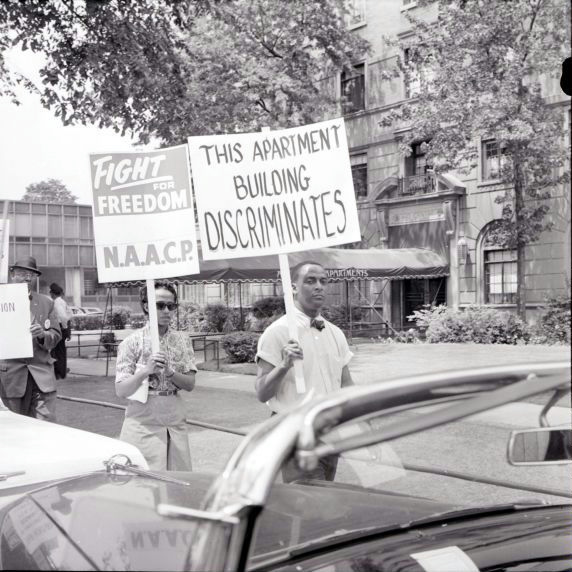Fair Housing: Timeline
Learn about the leadership of African-American legislators in the struggle to pass the Fair Housing Act of 1968 and the continuing effort to eradicate discriminatory housing policies and practices.
1866
The Civil Rights Act of 1866 grants full citizenship rights to all males born in the U.S. regardless of race and guarantees all U.S. citizens the rights to inherit, purchase, lease, sell, hold, or convey real and personal property.
1962
President John F. Kennedy issues Executive Order No.11063 prohibiting discrimination based on race, color, religion, or national origin in federally owned, operated, or assisted housing.
1964
Congress enacts the Civil Rights Act of 1964 (P.L. 88-352). Title VI of the Act prohibits discrimination on the basis of race, color, or national origin in programs and activities receiving federal financial assistance. This includes any housing receiving federal funding.
1966-1967
Congress regularly considers legislation to prohibit discrimination in private housing transactions but fails to pass fair housing legislation.
February 6, 1968
Sens. Walter Mondale (MN) and Edward Brooke (MA), the only African American member of the Senate at the time, submit the Fair Housing Act of 1968 (S. 1358) for inclusion as an amendment within the Civil Rights Act of 1968 (H.R. 2516) a larger civil rights bill to protect civil rights workers.
February 29, 1968
The National Advisory Commission on Civil Disorders releases its landmark report, commonly known as the Kerner Commission Report. Sen. Brooke and the other members of the 11-person Commission conclude residential segregation of African Americans along with other economic and social inequalities, contributed to the urban disorders, or riots, of 1967.
April 4, 1968
Dr. Martin Luther King Jr. is assassinated. Riots erupt in cities around the country including Washington, D.C. President Lyndon B. Johnson calls for passage of fair housing legislation as a way to honor King’s memory.
April 11, 1968
President Johnson signs the Civil Rights Act of 1968 (P.L. 90-284) into law. Title VIII of the act, commonly known as the Fair Housing Act, prohibits discrimination on the basis of race, color, religion, or national origin in the sale, rental, or financing of housing.
May 1968
The Truth in Lending Act, Title I of the Consumer Credit Protection Act, (P.L. 90-321) becomes law. The act requires lenders, including lenders in the mortgage industry, to disclose terms and cost of loans so that consumers can make informed choices about credit.
1973
Congress enacts Section 504 of the Rehabilitation Act of 1973 (P.L. 93-112) to prohibit discrimination based on disability in any program receiving federal financial assistance.
1974
Through the Equal Credit Opportunity Act (P.L. 93-495), Congress prohibits creditors from discriminating against any applicant on the basis of sex or marital status. The Act was amended in 1976 (P.L. 94-239) to include the prohibition of discrimination based on race, color, religion, national origin, age, source of income or because the applicant has in good faith exercised any right under the Consumer Credit Protection Act.
1974
Housing and Community Development Act of 1974 (P.L. 93-383) becomes law. Through Section 109 of Title I of the Act, Congress makes it illegal to discriminate on the basis on sex in housing. Other sections of the Act expand the definition of discriminatory housing practices to include interference and intimidation. Additionally, the act establishes the requirement that communities receiving Community Block Grant affirmatively further fair housing.
1975
The Home Mortgage Disclosure Act of 1975 (P.L. 94-200), cosponsored by Sen. Brooke, mandates financial institutions providing federally related mortgage loans annually reveal, by census tracts or ZIP code, how much they are loaning to specific geographical areas. This act serves as way to discourage redlining, or geographical discrimination, in the mortgage lending industry.
1975
Congress prohibits discrimination on the basis of age in programs or activities receiving federal financial assistance through passage of the Age Discrimination Act of 1975 (P.L. 94-135).
1977
The Community Reinvestment Act (P.L. 95-128), Title VII of the Housing and Community Development Act of 1977, becomes law. Designed to reduce redlining, the act encourages lending institutions to meet the needs of borrowers in the local communities in which they are charted including borrowers from low- and moderate-income neighborhoods. Del. Walter Fauntroy (D-DC) and Rep. Parren Mitchell (D-MD) cosponsor the bill.
1977-1988
Congress regularly considers amendments to strengthen enforcement of the Fair Housing Act. CBC members play an important role in the legislative effort by sponsoring many of these bills and advocating for victims of housing discrimination.
1979
Reps. Parren Mitchell (D-MD), William Gray III (D-PA), and Del. Walter Fauntroy (D-DC) convene the first meeting of the Congressional Black Caucus Housing Braintrust. CBC members and policy experts review proposed amendments to strengthen Fair Housing Act enforcement at the inaugural meeting.
1987
The Fair Housing Initiatives Program authorized through passage of the Housing and Community Development Act of 1987 (P.L. 100-242) and later made permanent in the Housing and Community Development Act of 1992 (P.L. 102-550). The program strengthened HUD’s ability to enforce fair housing law by authorizing the Department to provide funding to state and local government agencies as well as non-profit groups which work to prevent or eliminate discriminatory housing practices through testing, education, or other programs.
September 13, 1988
President Ronald Reagan signs the Fair Housing Amendments Act of 1988 (P.L. 100-430) into law. The act adds handicap and familial status (families with children) to the list of protected classes under Title VIII of the Fair Housing Act. It also strengthens enforcement of fair housing law by making it easier for victims of discrimination to sue and stiffening penalties for those who discriminate. A majority of CBC members cosponsor the bill.
1990
The Americans with Disabilities Act of 1990 (P.L. 101-336) prohibits discrimination on the basis of disability in programs and activities made available by public entities including housing-related programs, public housing, housing assistance, and housing referrals as well as disability discrimination in the goods, services, facilities, privileges, and advantages, and accommodations of places of public accommodation owned, leased, or operated by private entities.
1994
President William Jefferson Clinton issues Executive Order No. 12892 which requires federal agencies to “affirmatively further fair housing” in their housing programs, makes the Secretary of HUD responsible for coordinating that effort, and establishes the President’s Fair Housing Council to assess the success of federal programs in promoting integrated housing.
1994
Congress enacts the Home Ownership Equity Protection Act as part of the larger Riegle Community Development and Regulatory Improvement Act of 1994 (P.L. 103-325) to address abusive lending practices in refinances and home loans with high interest rates or high fees.
1995
Housing for Older Persons Act of 1995 (P.L. 104-76), as cosponsored by Rep. Alcee Hastings (D-FL) and supported through vote by majority of CBC members, amends the Fair Housing Act to make it legal for certain housing intended for those 55 or older to prohibit families with children from moving in but not to discriminate on the basis of race, color, national origin, religion, sex, or disability.
2008
Rep. Al Green (D-TX) leads the CBC and other Congressional colleagues in commemorating the 40th Anniversary of the Fair Housing Act and 20th Anniversary of the Fair Housing Amendments Act through the introduction of H.Res. 1095. The resolution and CBC comments from the House floor underscore importance of homeownership and fair housing and lending laws, as well as encourage all levels of government to rededicate themselves to fair housing law enforcement and ideals.
2008
Congress passes the Secure and Fair Enforcement for Mortgage Licensing Act of 2008, Title V of the Housing and Economic Recovery Act of 2008 (P.L. 110-289), to improve underwriting standards by the establishment of a registration system for mortgage originators.
2010
Congress passes major overhaul of the nation’s financial system through the Dodd-Frank Wall Street Reform and Consumer Protection Act (P.L. 111-203). Title X of the Act creates the Bureau of Consumer Financial protection. Title XIV of the Act, also known as the Mortgage Reform and Anti-Predatory Lending Act, amends the Truth in Lending Act and other consumer financial laws to prevent mortgage-related abuses and ensure availability of responsible, affordable mortgage credit. Several CBC members contribute language to the law.
2013
Reauthorization of the Violence Against Women Act (P.L. 113-4) added housing protections for victims of domestic violence, dating violence, sexual assault, and stalking to the original bill.
2015
HUD under the Obama administration issues a new rule to implement the FHA’s 1968 mandate to “affirmatively further fair housing.” The Affirmatively Furthering Fair Housing (AFFH) Rule of 2015 required state and local governments that receive federal housing funds to take proactive steps to combat segregation and advance fair housing opportunities.
2021
Executive Order 13988, Preventing and Combating Discrimination on the Basis of Gender Identity or Sexual Orientation, issued under the Biden administration to require HUD to administer and fully enforce the Fair Housing Act to prohibit discrimination on the basis of sexual orientation or gender identity.




